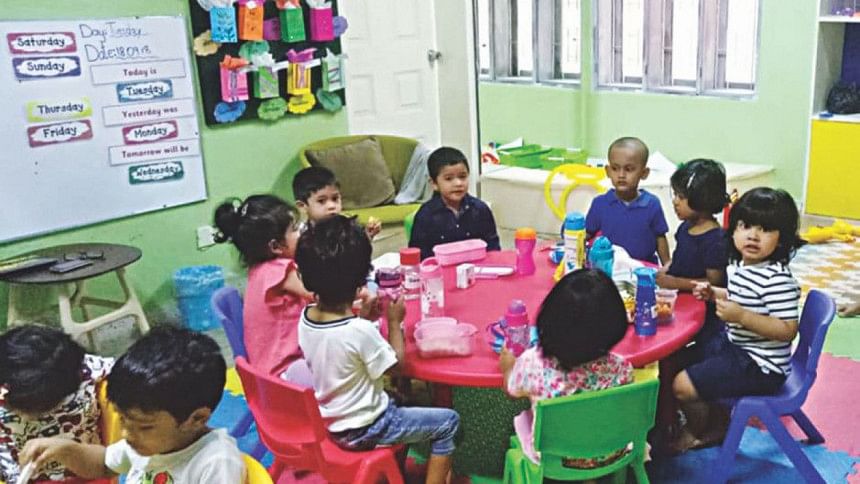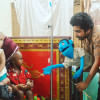Why early childhood education matters

Bangladesh has made considerable progress in early childhood development (ECD) but various challenges remain, especially in rural and disadvantaged areas. It's worth recalling that the authorities, through the National Children Policy 2011, set their sights on improving ECD programmes for children from birth to 8 years old. The aim is to lay a strong foundation for children's cerebral, emotional, and social development while setting the stage for the nation's socio-economic growth.
The Ministry of Women and Children Affairs and the Ministry of Primary and Mass Education are at the helm of these affairs. However, while pre-primary education (PPE) enrolment has improved, it continues to lag in rural and marginalised areas. Enrolment in pre-primary programmes in rural areas is drastically lower than urban centres like Dhaka, underscoring the disparity that impacts children's readiness for primary school and their future learning outcomes.
Bangladesh's ECD landscape is one of collective efforts. While the government plays a central role, organisations like UNICEF, Save the Children, and local NGOs provide technical support, funding, and on-the-ground services. These groups often target the gaps in coverage, particularly in remote areas where access is limited. Despite these collaborative efforts, substantial gaps remain. For example, community-based early childhood centres, known as Shishu Bikash Kendra, are a crucial state initiative aimed at bringing education closer to home. However, their success depends heavily on active community involvement, which remains inconsistent due to resource limitations. In many cases, these centres operate without adequate infrastructure or teaching materials, hampering their ability to deliver meaningful educational outcomes.
Parents and communities are also essential to making ECD programmes work, but the backbone of these efforts lies in the hands of teachers and caregivers, many of whom lack formal training and ongoing professional development. In rural areas, teachers are often underpaid, overworked, and under-supported. This not only affects the children directly but also undermines the long-term sustainability of ECD programmes.
While increasing enrolment is crucial, the quality of early childhood education is where we must focus. And currently, it leaves much to be desired. Most programmes lack standardised curricula and materials. Without proper training, teachers struggle to deliver a consistent standard of education, particularly in rural areas. The absence of adequate facilities and educational aids further compounds this problem, leaving children at a disadvantage compared to their urban peers.
Another significant challenge is the lack of coordination between stakeholders. Government ministries, international organisations, and NGOs often work in silos, leading to uneven service delivery. Some regions receive adequate support, while others are left behind. Adding to the problem is the absence of a comprehensive monitoring and evaluation system, making it difficult to assess the impact of ECD programmes and allocate resources effectively. A unified strategy that aligns the efforts of all stakeholders is urgently needed to bridge these gaps.
The stakes couldn't be higher. With 28.61 percent of its population under the age of 14, Bangladesh has a young and promising future. However, without urgent investment in early childhood education, this demographic dividend could turn into a missed opportunity. Studies have shown that quality early childhood education can reduce poverty, boost academic performance, and improve socio-economic mobility.
The first few years of life are particularly critical for brain development, with 90 percent of a child's brain growth occurring by age 5. Evidence-based ECD programmes have the potential to set children, especially those from disadvantaged backgrounds, up for success from the very beginning. If Bangladesh wants to meet its Sustainable Development Goals (SDGs) and achieve long-term development, the focus must shift to ensuring all children have access to quality early childhood education.
Therefore, the current gap in access and quality needs immediate attention. The government, along with its international partners, must act swiftly to ensure that every child has the opportunity to start their educational journey on the right foot. High-quality early childhood education isn't just an investment in individual children; it's an investment in the future of the nation.
Maisha Khan is a Teach For Bangladesh fellow.
Views expressed in this article are the author's own.
Follow The Daily Star Opinion on Facebook for the latest opinions, commentaries, and analyses by experts and professionals. To contribute your article or letter to The Daily Star Opinion, see our submission guidelines.

 For all latest news, follow The Daily Star's Google News channel.
For all latest news, follow The Daily Star's Google News channel. 










Comments